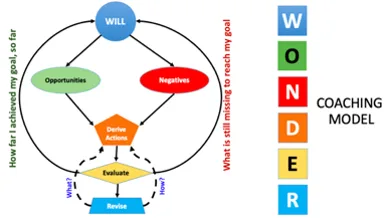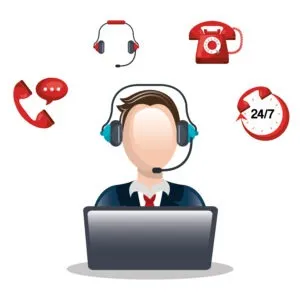
What is “WONDER” Coaching Model?
This is a change management (coaching) technique that can be used for an individual or a team to solve a problem or to help them to achieve a particular goal or improve their performance. In a coaching conversation, the coach can use this technique to coach the Coachee. The steps involved in “WONDER” coaching technique will help the coachee to understand their goal in more detail and identify the positive driving forces (Opportunities) and blockers (Negative forces) and accordingly to help deriving the actions to meet the goal. The team will work on these actions for a stipulated time and then evaluate the results of those actions. At this point they check how far the goal has been achieved and how far they still have to travel to reach the goal. Accordingly, they revise their plan of actions to get any corrections based on their progress so far.
At every stage in WONDER coaching technique, powerful questions play a vital role in order to make the coachee to clearly understand the current of that stage. These questions have to be open ended questions and should ignite the thinking within the coachee.
Below are the stages of WONDER coaching technique:
Ø WILL: The goal or the problem to solve for an individual or a team
Ø OPPORTUNITIES: The positive driving forces that help to the goal
Ø NEGATIVES: The blockers that push back the goal
Ø DERIVE ACTIONS: To identify clear and concise actions to reach the goal based on the opportunities and blockers
Ø EVALUATE: This is the milestone to review the progress after implementing the actions and to check how far the goal is reached.
Ø REVISE: Here the team or individual identify any changes or improvements to the actions based on the results of evaluate step described above.

Before starting the coaching conversation, make sure you have a coaching agreement for the session with the coachee.
Powerful questions the can be asked during the above stages:
Will:
- What is the goal you want to achieve or the problem to solve?
- What does it mean for you?
- Where do you rate this goal at from the 1 – 10 range (1 least, 10 highest)?
- How will this goal help you personally or professionally?
- How do you feel after achieving the goal?
- How does your performance change after achieving the goal?
- What does success look like with respect to this goal?
- What can you do to achieve the goal?
- What will change if you achieve this goal?
- What will not change if you achieve this goal?
- How will this goal help your future?
Opportunities:
- What are the positive forces you see to achieve this goal?
- Who around you can support you to achieve this goal?
- What environmental factors help you to achieve this goal?
- How do you feel when you find a great opportunity that helps you achieve your goal?
- Can you arrange the opportunities you identified as per their probability of occurrence?
- What is in your control to use the prioritised opportunities?
- What or who can influence you to use those opportunities?
- If you have only one way to achieve the goal, what would that one way be?
Negatives:
- What are the blockers you see that pushes you away from your goal?
- Who around you might trouble you to block you?
- What are negative environmental factors?
- How do you feel when you see these blockers occur on your way?
- Who can control these blockers?
- Who can influence these blockers?
- If there is a way to unblock yourself from these blockers, what is that?
- How are you blocking yourself from reaching your goal?
- How do you feel when all these blockers disappear?
- Can you prioritise these blockers?
Derive actions:
- What do you see at this moment to do to achieve your goal based on opportunities and negatives?
- What actions can you immediately start with to achieve your goal?
- Let’s imagine it’s a year from now and you have accomplished your goal, what steps have you taken to achieve it?
- Suppose, you had all the information you needed, what would be your immediate next step?
- If you were at your best, what would be your immediate action?
- What could you do if you did not care what other people thought?
- Imagine having a chat with a wisest person you can think of, what would they tell you to do?
- From where you are now, what would be the first step to achieve your goal?
- What does the timeline look like to complete the actions you identified?
- What will you do in the next 24 hours/1 week/1 month?
Evaluate:
- How can you assess the progress of your goal based on the actions you did so far?
- What is achieved and what is not?
- What did work?
- What did not work?
- How do you feel right now?
- How are you blocking your own progress?
- Let’s imagine you have achieved your goal, from your current position how far is that situation?
- Who is accountable to evaluate your progress?
- Who can influence or control your progress?
- What changes you see to the opportunities and negatives at this point of time?
- How confident are you with respect to the direction to achieve your goal at this point?
Revise:
- What did you learn from the options you worked up on so far?
- What changes you would like to make to the opportunities and negatives in order to make them work?
- How did you feel when something did not work in your plan?
- How confident are you with the current plan of action?
- What changes you would like to make to your action plan to make it work better?
- Who can help/influence/support you?
- If you were to start a new plan afresh, what would it look like?
- What is blocking you in coming up with a new plan if the existing plan does not help?
- What was the most challenging task you did in your existing plan and what was the result?
Above steps can be used by coach in a series of conversations with the coachee. The steps WILL, OPPORTUNITIES, NEGATIVES, DERIVE ACTIONS can be done in one conversation and give the coachee time to work on the action plan. Before closing the coaching session, let coachee commit for a timeline to execute the action plan. After that have a next conversation (coaching session) to run the steps EVALUATE and REVISE.
Additionally, for those interested in advancing their agile coaching skills, various training programs such as CSM training courses in Hyderabad, CSPO training in Hyderabad, and Agile Scrum courses in Hyderabad are available. These programs offer comprehensive learning experiences, including specialized courses like A CSPO training in Hyderabad, which can further enhance your coaching techniques and understanding of Scrum methodologies.
Additionally, for those interested in advancing their agile coaching skills, various training programs such as CSM training courses in Hyderabad, CSPO training in Hyderabad, and Agile Scrum courses in Hyderabad are available. These programs offer comprehensive learning experiences, including specialized courses like A CSPO training in Hyderabad, which can further enhance your coaching techniques and understanding of Scrum methodologies.
Recent Posts
- How “AI for Product Owners” certification helps Product Owners? 02/05/2025
- How “AI For Scrum Masters” certification helps the Scrum Masters? 02/05/2025
- How to handle adhoc urgent requests during Sprint? 27/03/2025
- How to measure success/performance of a Scrum Master? 27/03/2025
- How to handle non performing team members in a Scrum Team? 27/03/2025

